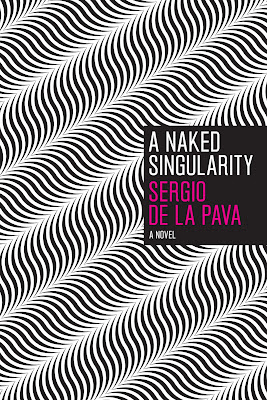Title: A Naked Singularity
Author: Sergio de la Pava
ISBN13: 9780226141794
Origin: USA
Length: 688 pp.
Publisher: University of Chicago Press
Released: May 2012
Initial Thoughts:
I was determined to obtain a copy of this book after reading its (very much hyped) blurb it in a spring catalogue at work (I work at a
bookstore). The promotional review lauded the book as "generation defining" and prophesied de la Pava's intellectual induction into the literary territory shared by David Foster Wallace, Herman Melville, and Dostoevsky. So,
pretty much the highest fucking praise you can get. I received a review copy a couple weeks ago, and I believe enough time has now passed to give a charitable review to the book.
Wow. Well, I couldn't put it down, but that's not always an indication of quality. The plot: 24-year-old Casi is a Public Defender living in Brooklyn who has never
lost a case. He's 2nd generation Colombian, a character trait that factors into the plot more figuratively than literally (though a nice recipe for empanadas in included, strangely...). Of course, a major turn of action in the book centers on Casi's first loss in court.
The loss is enough of a blow that Casi begins to lose his grip on reality, a slippage hastened by a cast of humanities-studying grad school roommates (yikes), a mute niece, enormous credit card debt, and morally-disinclined co-workers. Dialogue often reads like undergraduate philosophy or theology courses, where the juiciest bits about the innate goodness of humans, the historicity of Jesus, and the veracity of cause-and-effect are discussed as calmly and normally as a person discusses the weather. These conversations will undoubtedly please intellectual readers, although most of the ideas were not revelatory to me, being an ex-grad student in humanities and all. One thing the dialogue is though, is funny. Casi is an extremely likable narrator; his perception is extremely rich without being omniscient. There's also plenty of action, potential symbolism aplenty, and enough courtroom drama to satiate anyone with a secret
Law & Order fetish (me).
There are a scant few disagreement elements of
A Naked Singularity. I almost completely skipped over a harshly integrated side-narrative involving a
Puerto Rican boxer, though it would have made an excellent piece of journalism in the New Yorker or something similar. I would also like to have seen more character development in Casi's totally intriguing sister
The less satisfactory elements were of little detriment to my experience with the book though. Like I said, I couldn't put it down -
A Naked Singularity is quite compelling.
Title Rating: 5/5
"
Naked singularity" is a term borrowed from physics. Short story: black holes, the gravitational traps resultant of collapsed stars, have two points: the singularity (the point at which matter/light/time[?] is sucked into the black hole) and the event horizon (the field surrounding the singularity from which escape is impossible). Event horizons shield the actual point of the singularity, making the singularity invisible to physicists/astronomers/whoever deals with this shit.
Naked singularities have no event horizon, and therefore "we" can see them. Matter can pass in and out of a naked singularity, whereas it is...crushed? sent to another dimension? in regular black holes. Thus: regular black holes are areas at which the laws of physics break down. Naked singularities are doubly problematic because
they don't even have a physics-governed region that surrounds them. Basically, naked singularities are being poised by physicists as the potential generators of astronomical phenomena that defy the laws of physics.
The title of de la Pava's novel, then, betrays the audience for which it is intended: those who grasp, or at least have an interest in, the "basics" of theoretical physics. These readers are the same ones who follow with enthusiasm his philosophical tangents and enjoy the syllogisms embedded throughout the text. And this is fine with me -
A Naked Singularity is a book for people who went to college, and then probably some more after that. The academic publisher, University of Chicago, pretty much ensures that. But even if you just thought "naked singularity" was a cool phrase (this bitch right here), enjoy the dive into the unknown.
A Naked Singularity is, after all, very much about approaching that mysterious point, entering, and then returning (consequentially, the book is divided into three parts). Like his narrator Casi, de la Pava is 2nd generation Colombian-American. De la Pava's homage to magical realism, the genre born and perfected on the South American continent,
is just that - the second generation of magical realism. There was a time before
The Invention of Morel and "The Library of Babel," and then they gloriously happened, and now we are in the globalized age, where
One Hundred Years of Solitude is regarded by people all over the world as the greatest novel, ever.
A Naked Singularity spans a mere several weeks, but it may as well have been a hundred years - such is the pace of life now. De la Pava, like Murakimi and Rushdie, is gifted in imbibing magic into his locally experienced 21st century. And perhaps all of the "magic" that remains in de la Pava's world is attributable to astrophysical anomalies, but then again, maybe these anomalies have been magic's catalyst the whole time. I guess that's really the question.


